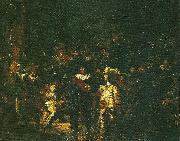Wholesale Oil Painting No Minimum |
|||||||||||
|
|
|||||||||||

|
|||||||||||
|
|
|
||||||||
Ernst Josephson1851-1906 Swedish Ernst Josephson Gallery was a Swedish painter from a prominent Jewish family, whose main work was done on portraits and paintings of folk life. He did his art studies in Italy, France and the Netherlands, among others, and is reputed to have said at the age of 20: "I will become Sweden's Rembrandt or die." However, his life was marred by illness. He contracted syphilis at a relatively young age, and in 1888 he became mentally ill during a visit to Brittany, having religious hallucinations and believing that he was God and Christ. He was later taken to hospital in Uppsala and diagnosed with schizophrenia, but continued working throughout his disease, often while in a trance-like state. He also wrote poetry, in the collections Svarta rosor (1888, Black Roses) and Gula rosor (1896, Yellow Roses). His main work, Strömkarlen (1884, the Nix), was refused by the Swedish National Museum in Stockholm - however, Prince Eugen, Duke of Narke, bought the painting in fury over the decision. Grandfather of Erland Josephson. |
||||||||
|
|
||||||||
nattvakten
nattvakten Painting ID:: 64100 |
kopia efter rembrandt
1876 kopia efter rembrandt 1876 |
|||||||
|
|
||||||||
|
REMBRANDT Harmenszoon van Rijn Born 1606, Died 1669.One of the great Dutch painters and printmakers of the 17th century, Rembrandt van Rijn is best known for his expressive use of light and shadow (also called chiaroscuro) in his many portraits. Raised in Leiden, he studied with Pieter Lastman (1583-1633) in Amsterdam, then returned to Leiden around 1625 and set up shop as a teacher and portrait artist. Sometime between 1630 and 1632 Rembrandt relocated to Amsterdam, where he spent the rest of his career. Though he had his detractors (some of whom considered him coarse and "low born"), Rembrandt was successful and famous during his lifetime, though he fell on financial hard times in his later years. He was a master printer and produced hundreds of group portraits and historical paintings, including The Anatomy Lesson of Dr. Tulp (1632), The Military Company of Captain Frans Banning Cocq (1642) and Aristotle with a Bust of Homer (1653). His portraits -- including a lifelong trail of intriguing and rather frank self-portraits -- reveal his interest in psychological study and continue to be admired as landmarks in Western art. The Military Company of Captain Frans Banning Cocq is also known as "The Night Watch" because it was thought the painting depicted a nighttime scene. When the painting was cleaned in the 1940s it became obvious that it depicted a daytime scene... He married Saskia van Ulenburgh (also Uylenburgh) in 1634. nattvakten 1642 se |
||||||||
|
|
||||||||
|
Prev Next
|
||||||||
|
|
||||||||
|
Related Paintings to REMBRANDT Harmenszoon van Rijn :. |
||||||||
|
|
||||||||
|
CONTACT US |

